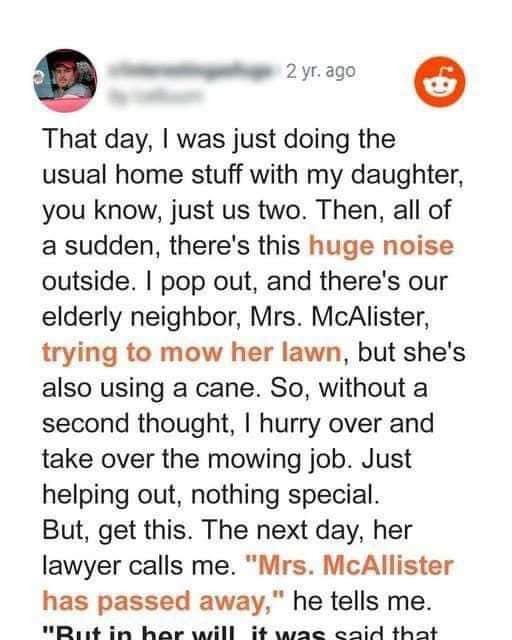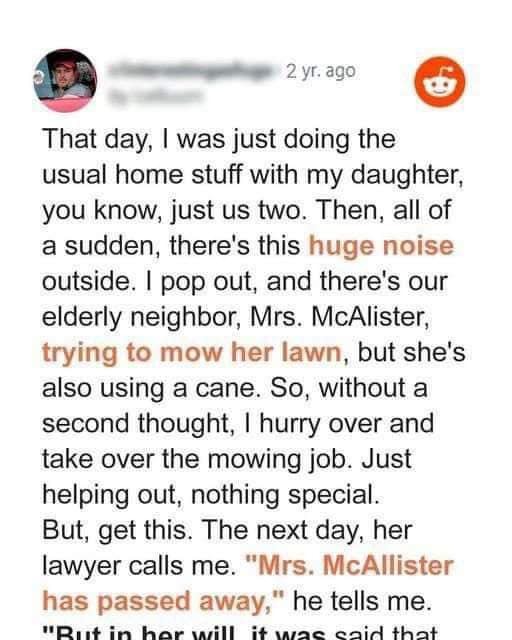That day started out like any other. I was in the kitchen, flipping pancakes and chatting with my daughter, Molly. She is eight years old, full of curiosity and laughter. After breakfast, we planned to spend our morning cleaning the living room and doing laundry—nothing too exciting, but just ordinary tasks that fill a day. We were comfortable in our small home, enjoying our simple routine together.

Suddenly, a loud noise from outside made my heart jump. It sounded like a roar, but more strained and uneven, like a machine that did not want to run. Molly and I went to the window and peeked through the blinds. Our elderly neighbor, Mrs. McAllister, was out in her yard. She was trying to mow her lawn with an old push mower. The mower sputtered and jerked, and to make matters worse, Mrs. McAllister was also leaning on her cane. She would push the mower a few steps, then stop to catch her breath and steady herself on the cane. It looked like she was in trouble.
Without a second thought, I grabbed my shoes and hurried outside. I shouted, “Mrs. McAllister, let me help you with that!” She turned her head, her eyes looking tired but grateful. She tried to protest—she always insisted she could manage on her own—but I gently reached out and took the mower’s handle. “I’ll do the mowing,” I told her. “You can just sit on your porch or rest for a while.”
She sighed and nodded, clearly relieved. So I pushed that old, rattling mower across her yard, row by row. The sun beat down, but a cool breeze blew now and then, which helped. Molly stood by the fence, smiling and giving me a thumbs-up each time I turned around. Mrs. McAllister watched from her porch, her cane resting by her side, her hands folded in her lap. Occasionally, she called out tips about how she used to keep her lawn neat or how she’d grown roses in the backyard. I kept telling her not to worry, that I would make sure it looked nice for her.
When I finished, Mrs. McAllister tried to hand me a few crumpled bills as a thank-you, but I shook my head. “Oh no, you keep that,” I said gently. “I’m just being a good neighbor, no charge.” She looked at me with a mix of gratitude and pride. Then she broke into a wide smile and said, “Well, thank you, dear. People like you are rare these days.” We chatted for a few more minutes about the weather and about Molly’s latest school project, then Molly and I headed back home. I felt warm inside, not just from the sun, but from the simple joy of helping someone who needed it.
That night, Molly and I ate dinner together and talked about what we might do over the weekend. Maybe see a movie, or go to the park. Life felt peaceful, and I hardly thought about Mrs. McAllister’s lawn again. I fell asleep feeling content, not realizing that this day would soon take on a new meaning.
The next morning, I was washing dishes when my phone rang. It was an unfamiliar number. I hesitated, thinking it might be a spam call, but answered anyway. A polite voice on the other end introduced himself as Mr. Webster, a lawyer. He asked if I was the person who lived next door to Mrs. McAllister. I told him I was. Then his voice grew gentle. “I’m sorry to inform you that Mrs. McAllister has passed away,” he said. My breath caught in my throat. It was a shock. I had just seen her the previous day, sitting on her porch, waving at me. She hadn’t mentioned feeling ill or anything serious.
Mr. Webster explained that she had been taken to the hospital overnight after complaining of chest pains, and she passed away early in the morning. My eyes welled up with tears. Mrs. McAllister had always seemed so strong, even as she struggled with age and that cane. Knowing she was gone felt strangely heavy, like a big piece of our quiet neighborhood had disappeared.
Then, Mr. Webster said something even more surprising. “I know this might be sudden,” he began, “but Mrs. McAllister mentioned you in her will.” I almost dropped the phone. Me? Why would she mention me in her will? I had only helped mow her lawn once or twice, and we had shared a few friendly chats. “Please come to my office when you can,” Mr. Webster continued. “I will explain everything there.”
My hands shook as I ended the call. Molly noticed my upset face and asked what was wrong. I told her gently that Mrs. McAllister had passed away, and that we needed to see her lawyer soon. She looked sad, remembering how the older lady would wave at her in the mornings. But neither of us could understand why Mrs. McAllister’s lawyer wanted to see me.
The following day, I went to Mr. Webster’s office, leaving Molly with a neighbor. My heart pounded, and I felt strange walking into a room that smelled like leather and old paper. Mr. Webster greeted me, offered his condolences again, and then handed me a folder. Inside was a small note written in Mrs. McAllister’s shaky handwriting and some official documents.
The note read: “To my kind neighbor—thank you for being a bright spot in my last days. Your kindness reminded me that good people still exist. Please accept what I leave behind as a token of gratitude.” Then I saw the details: Mrs. McAllister had left me her house, her car, and a small savings account. My eyes widened in disbelief. Why would she do this for me? I only mowed her lawn. I sat there, speechless, as Mr. Webster explained that she had no living family members and felt a deep sense of thanks for my simple act of kindness.
I walked home in a daze, the folder clutched in my hands. At first, I felt a rush of joy. A house and some money could change everything for Molly and me. We had been renting for years. This could give us stability. But almost immediately, I felt a wave of guilt. I never helped her with any thought of personal gain. It was just the right thing to do. And now, I wasn’t sure if I deserved her entire estate.
Molly, seeing my teary eyes when I got home, asked if everything was okay. I told her what had happened. She hugged me and said, “Mom, you were always good to Mrs. McAllister. I think she wanted to say thank you in a big way.”
I am still overwhelmed. Part of me wonders if I should accept the gift. Another part thinks maybe I should sell the house and donate the money to a charity that Mrs. McAllister would have cared about. Whatever I choose, her generosity will forever remind me that sometimes the smallest good deeds can leave the biggest impact.
Now, here is my question for you: if you were in my place, would you keep the inheritance and start a new life, or would you pass it on to help others, knowing Mrs. McAllister might have also supported that choice?




